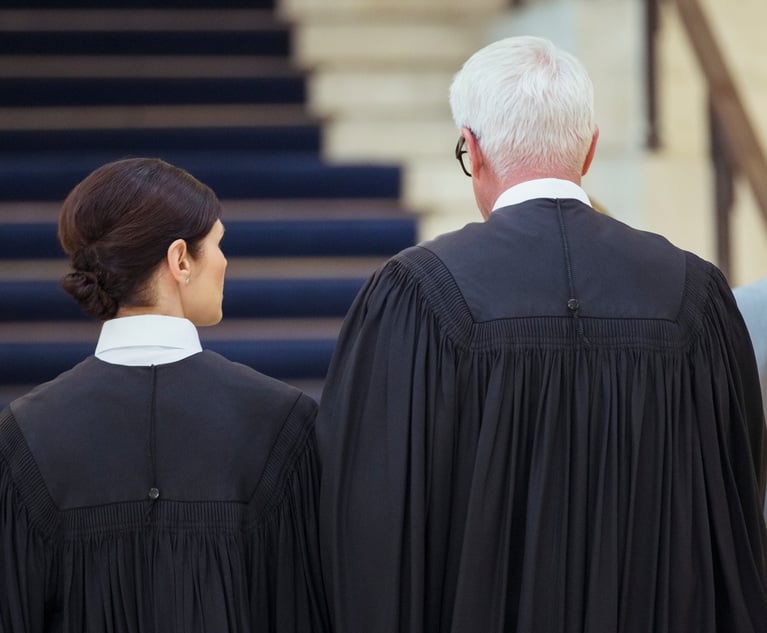 Hooters in downtown Atlanta (Photo: John Disney/ALM)
Hooters in downtown Atlanta (Photo: John Disney/ALM)Hooters Serves Up $1.3M in Gift Cards to Settle TCPA Class Action
The suit alleged thousands of violations of the Telephone Consumer Protection Act and includes almost $440,000 in attorney fees and expenses.
February 15, 2018 at 04:55 PM
5 minute read
Hooters, the Georgia-based chain of restaurants that made its name on hot-pants-clad waitresses, chicken wings and beer, has settled a class action suit by agreeing to provide up to $1.3 million in gift cards to about 55,000 people who received unwanted automated text messages.
Hooters also agreed to an injunction barring unsolicited messages to the class members in the future.
➤➤ Get class action news and commentary straight to your in-box with Critical Mass by Amanda Bronstad. Learn more and sign up here.
The settlement also includes more than $440,000 in attorney fees and expenses for the lawyers who brought the case under the Telephone Consumer Protection Act: Carr & Weatherby partners W. Pitts Carr and Alexander Weatherby; Nicholas Panayotopoulos and Nancy Rigby of Weinberg Wheeler Hudgins Gunn & Dial; and Marietta solo David Ghattas.
 Alex Weatherby of W. Pitts Carr & Associates, Atlanta. (Photo: Rebecca Breyer/ALM)
Alex Weatherby of W. Pitts Carr & Associates, Atlanta. (Photo: Rebecca Breyer/ALM)
The settlement was tentatively reached last summer but was only approved by Judge Leigh Martin May of the U.S. District Court for the Northern District of Georgia on Feb. 2.
Weatherby said the number of class members represents “the number of folks that we contend did not expressly consent to receive that message.”
Those class members have been contacted, he said, “and we're in the process of sending everybody their gift cards. The court entered the injunction last week, so that's the close of it,” Weatherby said.
Hooters of America is represented by Taylor English Duma partner Alisa Cleek, Stanford Wilson of Elarbee Thompson Sapp & Wilson and Becca Wahlquist of Los Angeles' Snell & Wilmer.
On Thursday, Wahlquist said she did not have permission to discuss the case.
According to the complaint and other filings, Hooters retained marketing company State of Texts to run its “mClub” promotional campaign for about six years. Customers could “opt in” to receive text messages containing ads or promotional offers in accordance with the TCPA's requirement that a caller must have “prior express written consent” before making an automated call or text.
It also allowed them to rescind that permission by sending an “opt-out” text.
In late 2014, Hooters was preparing to switch to a new automatic messaging company and, according to the complaint, asked State of Texts for the entire database of phone numbers, including the opt-outs.
In emails quoted in the complaint, State of Texts warned a Hooters executive not to send messages to the numbers because it “will open up legal grounds” against Hooters for TCPA claims.
Nonetheless, it said, Hooters' new contractor used the database to text thousands of messages saying “our mClub has moved! Don't worry, you'll still receive exclusive news, just from a new number. Reply STOP to unsubscribe …”
Class representative plaintiff Michael Etzel had opted in to the mClub some time earlier but had also opted out before he received the Hooters text on Jan. 28, 2015.
Etzel emailed Hooters complaining about receiving the text despite having opted out and received a message from Hooters saying “the company we previously paid to do our text marketing provided us with an erroneous list of subscribers.” His name was removed, it said, apologizing for any inconvenience.
Etzel filed the lawsuit in April 2015.
Weatherby said Hooters continued to claim it was given a list that inadvertently contained the opt-outs, but a memorandum supporting the settlement stated that the parties engaged in settlement discussions throughout the course of the litigation.
According to the finalized settlement, two “tiers” of class members will receive the gift cards: Tier One members, who actively opted out of the program but were still included in the database, will receive $50 gift cards.
Tier Two members are those who never responded to a 2013 Hooters text requesting that they actively opt in after the Federal Communications Commission ruled that express consent to receive marketing messages was required under the TCPA. They will each get a $20 card.
The settlement also includes up to $120,740 to cover any cost overruns in administrative expenses. Any leftover money will be donated to the Atlanta Union Mission.
This content has been archived. It is available through our partners, LexisNexis® and Bloomberg Law.
To view this content, please continue to their sites.
Not a Lexis Subscriber?
Subscribe Now
Not a Bloomberg Law Subscriber?
Subscribe Now
NOT FOR REPRINT
© 2025 ALM Global, LLC, All Rights Reserved. Request academic re-use from www.copyright.com. All other uses, submit a request to [email protected]. For more information visit Asset & Logo Licensing.
You Might Like
View All

Spalding Jurors Return $12M Verdict Against State Farm Insurance Client
10 minute read

Trending Stories
- 1Just One Cookie? Justices to Decide Liability for Half-Truths
- 240% Contingency: A New Ruling Just Cost This Lawyer $827K in Legal Fees
- 3Runners-Up and Shout-Outs for Litigator of the Week
- 4Sorry. We Can't Get to Your Case: Judge Speaks Out on Judicial Shortages
- 5Despite Brexit, UK Lawyers Still Dominate on Big EU Antitrust Lawsuits
Who Got The Work
Michael G. Bongiorno, Andrew Scott Dulberg and Elizabeth E. Driscoll from Wilmer Cutler Pickering Hale and Dorr have stepped in to represent Symbotic Inc., an A.I.-enabled technology platform that focuses on increasing supply chain efficiency, and other defendants in a pending shareholder derivative lawsuit. The case, filed Oct. 2 in Massachusetts District Court by the Brown Law Firm on behalf of Stephen Austen, accuses certain officers and directors of misleading investors in regard to Symbotic's potential for margin growth by failing to disclose that the company was not equipped to timely deploy its systems or manage expenses through project delays. The case, assigned to U.S. District Judge Nathaniel M. Gorton, is 1:24-cv-12522, Austen v. Cohen et al.
Who Got The Work
Edmund Polubinski and Marie Killmond of Davis Polk & Wardwell have entered appearances for data platform software development company MongoDB and other defendants in a pending shareholder derivative lawsuit. The action, filed Oct. 7 in New York Southern District Court by the Brown Law Firm, accuses the company's directors and/or officers of falsely expressing confidence in the company’s restructuring of its sales incentive plan and downplaying the severity of decreases in its upfront commitments. The case is 1:24-cv-07594, Roy v. Ittycheria et al.
Who Got The Work
Amy O. Bruchs and Kurt F. Ellison of Michael Best & Friedrich have entered appearances for Epic Systems Corp. in a pending employment discrimination lawsuit. The suit was filed Sept. 7 in Wisconsin Western District Court by Levine Eisberner LLC and Siri & Glimstad on behalf of a project manager who claims that he was wrongfully terminated after applying for a religious exemption to the defendant's COVID-19 vaccine mandate. The case, assigned to U.S. Magistrate Judge Anita Marie Boor, is 3:24-cv-00630, Secker, Nathan v. Epic Systems Corporation.
Who Got The Work
David X. Sullivan, Thomas J. Finn and Gregory A. Hall from McCarter & English have entered appearances for Sunrun Installation Services in a pending civil rights lawsuit. The complaint was filed Sept. 4 in Connecticut District Court by attorney Robert M. Berke on behalf of former employee George Edward Steins, who was arrested and charged with employing an unregistered home improvement salesperson. The complaint alleges that had Sunrun informed the Connecticut Department of Consumer Protection that the plaintiff's employment had ended in 2017 and that he no longer held Sunrun's home improvement contractor license, he would not have been hit with charges, which were dismissed in May 2024. The case, assigned to U.S. District Judge Jeffrey A. Meyer, is 3:24-cv-01423, Steins v. Sunrun, Inc. et al.
Who Got The Work
Greenberg Traurig shareholder Joshua L. Raskin has entered an appearance for boohoo.com UK Ltd. in a pending patent infringement lawsuit. The suit, filed Sept. 3 in Texas Eastern District Court by Rozier Hardt McDonough on behalf of Alto Dynamics, asserts five patents related to an online shopping platform. The case, assigned to U.S. District Judge Rodney Gilstrap, is 2:24-cv-00719, Alto Dynamics, LLC v. boohoo.com UK Limited.
Featured Firms
Law Offices of Gary Martin Hays & Associates, P.C.
(470) 294-1674
Law Offices of Mark E. Salomone
(857) 444-6468
Smith & Hassler
(713) 739-1250






